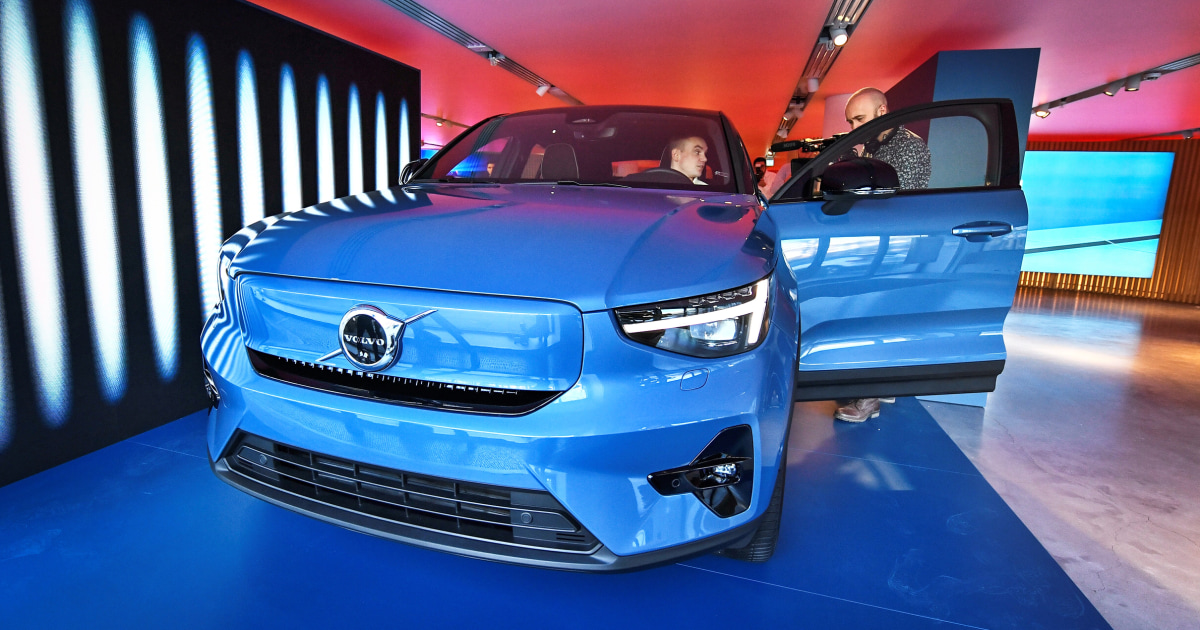
Volvo is the latest automaker to radically reshape its marketing and retail operations, moving all its vehicle sales online and going all-electric by 2030 — a process accelerated by the coronavirus pandemic.
“There’s going to be a dramatic shift and customers are asking for it,” said Carla Bailo, head of the Center for Automotive Research in Ann Arbor, Michigan. “The traditional dealership model is not very pleasant and most people are going online to do their homework before they buy. They’d be happy to just go pick up (their new vehicle) when they’re done, or even have it delivered to their home.”
On Tuesday, Volvo rolled out the C40 Recharge, its second long-range battery-electric vehicle. The automaker plans to offer only battery-electric vehicles and plug-in hybrids by 2025, then pare down to pure electric vehicles by 2030.
At the same time, it will slash the seemingly countless options buyers currently must wade through, shifting to pre-selected packages with only a few standalone options. Volvo also will automate the buying process. Dealers will largely just offer test drives, and handle service and repairs. Virtually everything else will go online.
The internet revolutionized the retail sector, but the transformation has been slow to take hold in the auto industry. That began changing when the pandemic struck. With showrooms closed much of last spring, the shift to virtual car buying accelerated “by at least two to three years from where I thought we would be,” Mark LaNeve, Ford’s recently retired head of sales, service and marketing, told NBC News.
It's not just the pandemic, however — it's also “the Tesla effect,” said Stephanie Brinley, principal analyst with IHS Markit. The California carmaker rejected the traditional industry model, replacing franchised dealers with factory-owned stores — even though that meant being locked out of some states.
“There’s an assumption Tesla was more successful by selling their vehicles differently,” Brinley said.
A recent study by advocacy group Plug-In America found barely 15 percent of respondents felt dealer salespeople were knowledgeable and able to help them while shopping for an EV. So, while plenty of shoppers still prefer the traditional retail model, many manufacturers are restructuring their sales process to let customers shape the way they buy a vehicle.
A recent study found barely 15 percent of respondents felt dealer salespeople were knowledgeable and able to help shop for an electric car.
“Nissan@Home gives customers what they’re asking for — the ability to purchase a vehicle on their terms,” said Dan Mohnke, the automaker’s vice president of e-commerce.
Similar to new programs launched at Lexus and Toyota, shoppers can do virtually everything online — at least within the limits of local laws.
As Tesla discovered, the big challenge is working with the various franchise dealer laws that can vary radically from state to state.
That’s why Nissan, Toyota, Volvo and others are retaining retailers in their new plans. But how dealers operate will change. Home deliveries are becoming more common. And dealers will more likely pick up and then return vehicles needing service and repairs, especially high-line products, according to various industry planners.
Dealers also will have smaller inventories than they have today, Brinley said. The typical U.S. showroom today maintains the equivalent of a 60- to 70-day supply of vehicles on hand, enough for two months of sales.
Volvo plans to cut that down to “a handful” of vehicles, said Anders Gustafsson, CEO of the automaker’s North American operations. It will keep more in central depots ready for quick shipment when an order comes in.
Some manufacturers are even looking to shift to a build-to-order model, Bailo said. Products will be assembled specifically to meet customer orders — though this approach would likely be used for those seeking unusual paint colors or features.
While franchise laws prevent a wholesale move away from traditional showrooms, with more and more of the buying process moving online, fewer dealers will be needed, analysts anticipate.
Cadillac, planning to go 100 percent electric by 2030, recently offered buyouts to dealers around the U.S. The focus is on retailers who don’t want to make the hefty investment to set up for EV sales and service — which can push into the hundreds of thousands of dollars. Cadillac will begin the transition with the launch of the all-electric Lyriq in 2022 and 150 dealers have so far accepted buy-outs.
Traditional carmakers will come under particular pressure to change their retail models, Bailo said. “There are a lot of new companies entering the battery-car market,” including Lucid, Rivian and Fisker, “and they have an open book” to start with a completely new approach like Tesla.
Automakers will have to adapt to changing consumer preferences and reduce the cost of their sales and marketing processes if they hope to survive, Bailo said.
"car" - Google News
March 03, 2021 at 04:19AM
https://ift.tt/3bSRWvW
Volvo to sell all its cars online, in latest example of how the pandemic has reshaped the auto industry - NBC News
"car" - Google News
https://ift.tt/2SUDZWE
https://ift.tt/3aT1Mvb
Bagikan Berita Ini














0 Response to "Volvo to sell all its cars online, in latest example of how the pandemic has reshaped the auto industry - NBC News"
Post a Comment